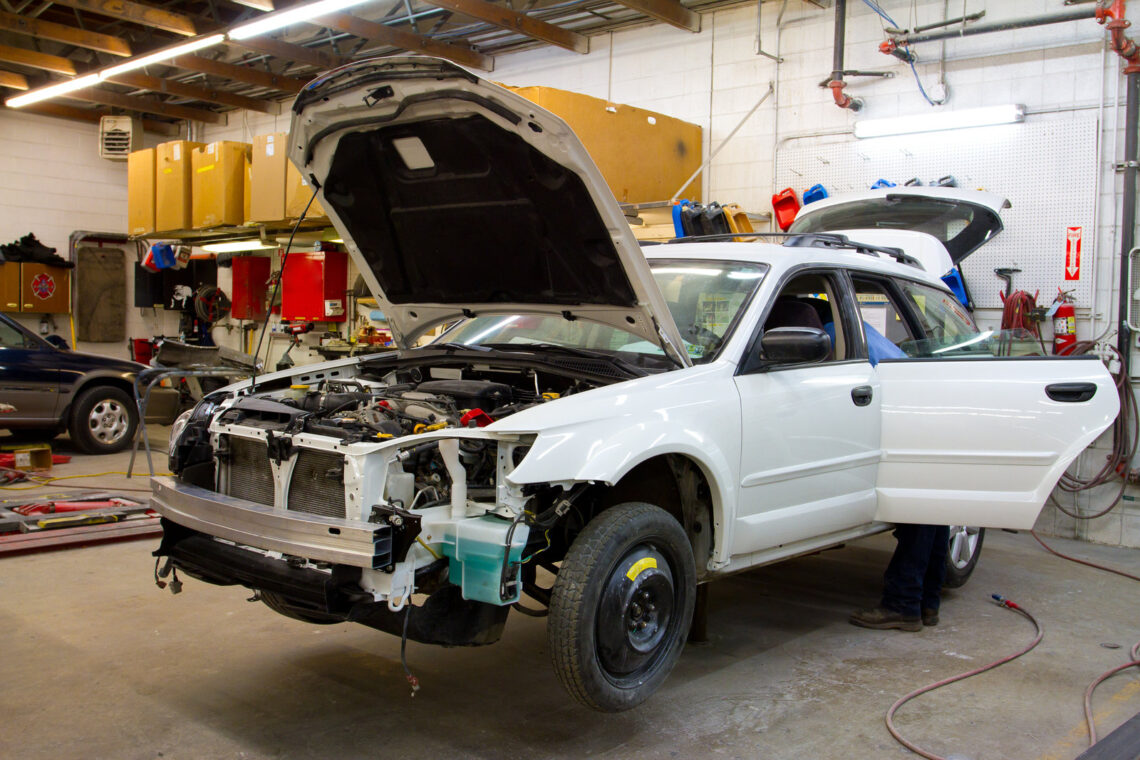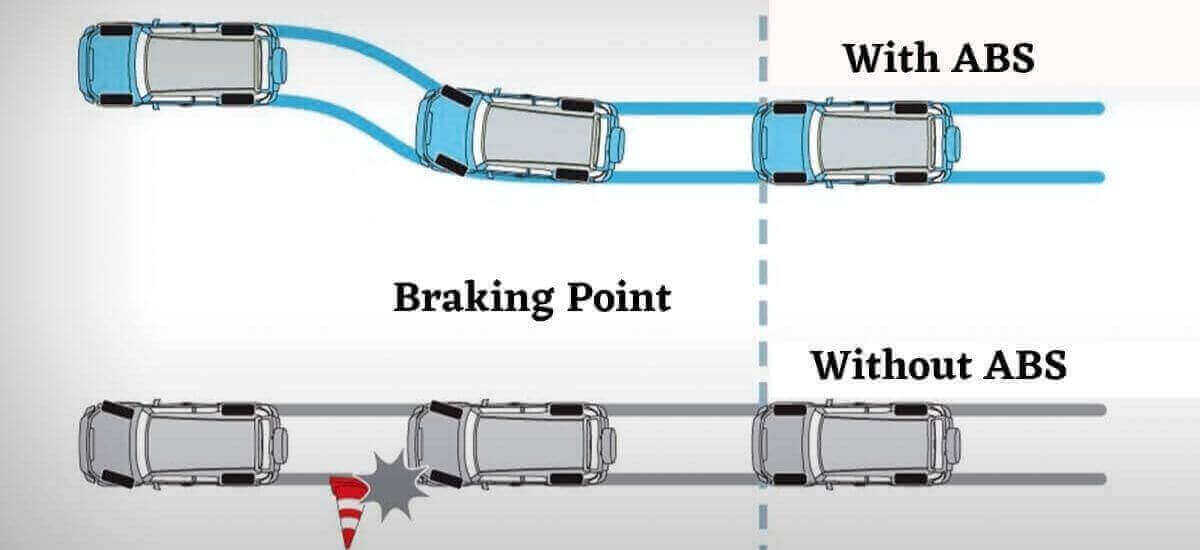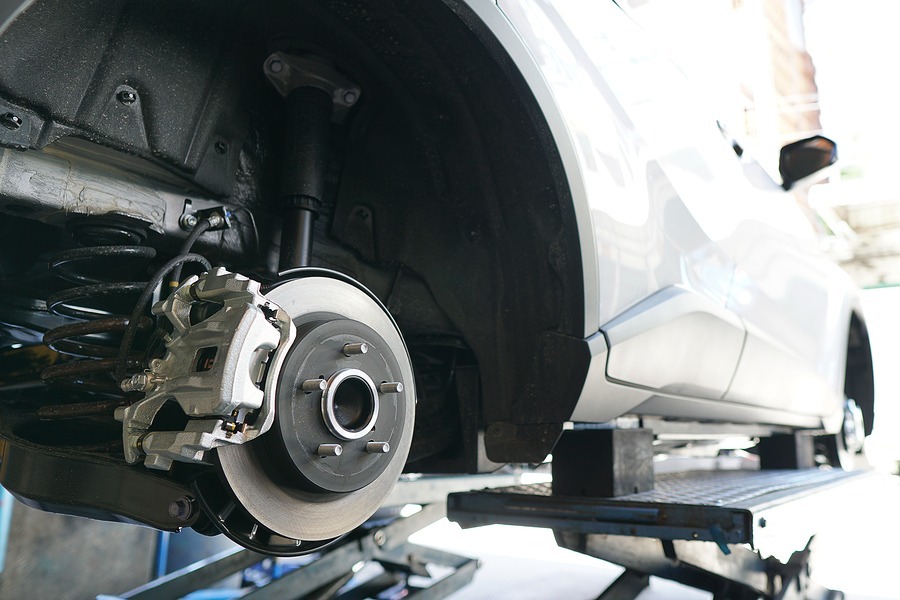How much does it cost to repair ABS brakes? It’s a question many drivers face when their car’s anti-lock braking system throws a warning light. ABS brakes are a crucial safety feature, ensuring your car maintains control during emergency braking situations.
But when they fail, the repair costs can vary significantly, leaving you wondering what to expect. This guide will break down the factors that influence ABS repair costs, explore DIY vs. professional repair options, and provide insights into preventative maintenance strategies to keep your ABS system in top shape.
From understanding the components of an ABS system and common causes of failure to exploring alternative repair solutions, this comprehensive guide equips you with the knowledge to navigate the complexities of ABS repair costs.
Understanding ABS Brakes
Imagine driving down a slippery road when you suddenly need to slam on the brakes. Your car might skid out of control, potentially leading to a dangerous accident. That’s where ABS brakes come in, acting as your vehicle’s safety net, preventing those dreaded wheel lock-ups.
How ABS Brakes Work
ABS brakes are an essential safety feature that helps you maintain control of your vehicle during emergency braking situations. They do this by preventing the wheels from locking up, allowing you to steer even while braking hard. This is especially crucial on slippery surfaces like ice or snow.
Components of an ABS Braking System
ABS systems are composed of several key components that work together to ensure smooth and controlled braking:
- Wheel Speed Sensors:These sensors are strategically placed at each wheel, constantly monitoring the wheel’s rotational speed.
- Electronic Control Unit (ECU):The brain of the system, the ECU receives data from the wheel speed sensors and determines when a wheel is about to lock up.
- Hydraulic Control Unit:This unit receives instructions from the ECU and modulates the hydraulic pressure to each brake caliper, allowing the brakes to release and re-engage rapidly.
- Brake Calipers:These calipers house the brake pads and pistons that press the pads against the brake rotors, slowing the vehicle down.
Causes of ABS Brake Failure
While ABS systems are generally reliable, they can sometimes experience malfunctions. Here are some common causes of ABS brake failure:
- Faulty Wheel Speed Sensors:Over time, these sensors can become damaged, leading to inaccurate readings and potentially triggering the ABS system to malfunction.
- Electrical Problems:Issues with wiring, connectors, or the ECU itself can disrupt the flow of information within the ABS system, leading to failure.
- Hydraulic System Issues:Leaks in the hydraulic lines or problems with the hydraulic control unit can compromise the system’s ability to modulate brake pressure.
- Brake Rotor or Pad Wear:Excessive wear on brake rotors or pads can affect the wheel speed sensor readings, triggering ABS malfunction.
Repair Cost Factors
The cost of repairing your ABS brakes can vary widely, depending on several factors. It’s like trying to predict the price of a fancy hat – the size, the material, and the brand all play a role. So, let’s dive into the factors that influence the cost of this crucial automotive system.
Factors Influencing Repair Costs
- Vehicle Make and Model:Just like a bespoke suit, some cars are more expensive to repair than others. Luxury vehicles often have more complex ABS systems, which can lead to higher parts and labor costs.
- Severity of Damage:A simple sensor replacement is like fixing a loose button – a quick and relatively inexpensive fix. But a major hydraulic system repair is like a complete wardrobe makeover – it’s more involved and costly.
- Labor Rates:Mechanics are like artists – some are more skilled and charge a premium. Labor rates can vary significantly depending on the location and the mechanic’s experience.
Cost Ranges for Different Repair Scenarios
- Sensor Replacement:Replacing a faulty ABS sensor is like replacing a missing sock – a relatively minor inconvenience. Expect to pay anywhere from $100 to $500, depending on the vehicle and the location of the sensor.
- Module Replacement:Replacing the ABS control module is like replacing your entire wardrobe – a significant investment. Costs can range from $500 to $2,000, depending on the vehicle and the complexity of the module.
- Hydraulic System Repairs:Repairing the hydraulic system is like replacing the plumbing in your house – a major undertaking. Costs can vary widely, but expect to pay at least $1,000 and potentially much more, depending on the extent of the damage.
Common ABS Repair Costs
| Vehicle Category | Labor Cost (Estimated) | Parts Cost (Estimated) | Total Cost (Estimated) |
|---|---|---|---|
| Compact Car | $100
|
$100
|
$200
|
| Sedan | $150
|
$200
|
$350
|
| SUV | $200
|
$300
|
$500
|
DIY vs. Professional Repair

So, you’ve got a problem with your ABS brakes. You’re probably thinking, “Should I tackle this myself, or call in the professionals?” It’s a valid question, and the answer depends on your mechanical skills, the complexity of the issue, and your tolerance for risk.
DIY Repair: Pros and Cons
Attempting ABS repairs yourself can be a rewarding experience, offering potential cost savings and a deeper understanding of your vehicle. However, it’s not without its challenges.
- Pros:
- Potential Cost Savings:DIY repairs can save you a significant amount of money compared to professional labor costs. This is especially true if you already have the tools and experience.
- Greater Understanding of Your Vehicle:Working on your ABS system can give you a deeper understanding of how your car works, which can be helpful in the future.
- Sense of Accomplishment:Successfully diagnosing and repairing your ABS system can be a great feeling of accomplishment.
- Cons:
- Complexity:ABS systems are complex and often require specialized tools and knowledge. Attempting repairs without proper training can lead to further damage or even safety hazards.
- Potential for Errors:Misdiagnosing or incorrectly repairing your ABS system can lead to further problems and even safety risks.
- Limited Resources:You may not have access to the same diagnostic tools and resources that professional mechanics do.
- Warranty Void:Performing DIY repairs on your ABS system could potentially void your vehicle’s warranty.
Professional Repair: Pros and Cons
While DIY repairs can be appealing, professional mechanics offer expertise, specialized tools, and access to comprehensive diagnostic systems.
- Pros:
- Expertise:Professional mechanics have extensive training and experience in diagnosing and repairing ABS systems.
- Specialized Tools:Mechanics have access to specialized tools and diagnostic equipment that are essential for accurate diagnosis and repair.
- Warranty:Most professional repairs come with a warranty, giving you peace of mind in case the problem reoccurs.
- Safety:Hiring a professional ensures that your ABS system is repaired correctly, minimizing the risk of further damage or safety hazards.
- Cons:
- Cost:Professional repairs can be expensive, especially if the problem is complex.
- Potential for Delays:You may have to wait for an appointment and for parts to be ordered, which can cause delays in getting your car back on the road.
Diagnosing Common ABS Issues
If you’re considering tackling ABS repairs yourself, it’s crucial to understand the potential problems and how to diagnose them. Here’s a step-by-step guide:
- Check the ABS Warning Light:The first step is to check if the ABS warning light is illuminated on your dashboard. This indicates a problem with the ABS system.
- Check the ABS Sensors:ABS sensors are located on each wheel and monitor the speed of each wheel. You can check the sensors for damage, corrosion, or debris.
- Check the ABS Control Module:The ABS control module is the “brain” of the ABS system. You can check the module for damage or signs of overheating.
- Check the ABS Hydraulic Unit:The hydraulic unit is responsible for applying pressure to the brakes. You can check the unit for leaks or damage.
DIY ABS Repair Risks and Limitations
While DIY repairs can be tempting, it’s important to be aware of the potential risks and limitations.
- Safety Risks:Improperly repairing your ABS system can create safety hazards, as it’s a critical part of your braking system.
- Increased Complexity:Modern ABS systems are incredibly complex, involving sensors, hydraulic units, and control modules. Attempting repairs without proper training can lead to further damage or even create new problems.
- Limited Tools and Resources:You may not have access to the same specialized tools and resources that professional mechanics do.
- Warranty Void:DIY repairs can potentially void your vehicle’s warranty.
Preventative Maintenance: How Much Does It Cost To Repair Abs Brakes
Preventative maintenance is the key to keeping your ABS brakes in tip-top shape and avoiding costly repairs. Just like regular oil changes and tire rotations, a proactive approach to your ABS system can save you a lot of headaches (and money) down the road.
Regular Inspections and Maintenance Schedule, How much does it cost to repair abs brakes
Regular inspections and maintenance are crucial for ensuring the longevity and optimal performance of your ABS system. A well-defined schedule can help you stay on top of these tasks and prevent potential issues from escalating.Here’s a suggested schedule for ABS system inspections and maintenance:
- Every 12 months or 12,000 miles:Conduct a visual inspection of all ABS components, including the sensors, wiring, and brake lines. Check for any signs of damage, corrosion, or leaks.
- Every 24 months or 24,000 miles:Perform a more thorough inspection, including testing the ABS system’s functionality. This can be done using a diagnostic scanner to check for any error codes.
- Every 36 months or 36,000 miles:Replace brake fluid. Brake fluid absorbs moisture over time, which can lead to corrosion and reduced braking efficiency.
- Every 48 months or 48,000 miles:Inspect and replace the ABS wheel speed sensors, if necessary. These sensors are crucial for the ABS system’s operation and can wear out over time.
- Every 60 months or 60,000 miles:Conduct a comprehensive inspection of the entire ABS system, including the hydraulic unit, control module, and wiring harness. This is a good time to address any potential issues before they become major problems.
Recommended Maintenance Tasks
Regular maintenance tasks can help extend the lifespan of your ABS components and ensure their optimal performance. Here are some key tasks to keep in mind:
- Inspect the ABS sensors:Check for any signs of damage, corrosion, or dirt buildup. Clean the sensors with a soft cloth and a mild cleaner if necessary.
- Inspect the ABS wiring:Look for any signs of damage, chafing, or loose connections. Repair or replace any damaged wiring.
- Inspect the brake lines:Check for any signs of leaks, corrosion, or damage. Replace any damaged brake lines.
- Inspect the ABS hydraulic unit:Check for any signs of leaks or damage. Replace the hydraulic unit if necessary.
- Inspect the ABS control module:Check for any signs of damage or corrosion. Replace the control module if necessary.
- Flush the brake fluid:This should be done every 2-3 years, or as recommended by your vehicle manufacturer. Brake fluid absorbs moisture over time, which can lead to corrosion and reduced braking efficiency.
Remember:It’s always best to consult your vehicle’s owner’s manual for specific maintenance recommendations and schedules.
Alternative Solutions

When your ABS system needs repair, you might be tempted to explore alternative solutions to save money. Used parts and aftermarket replacements offer seemingly appealing options, but it’s crucial to understand the potential downsides before diving in.
Used Parts
Used parts, often found at junkyards or online marketplaces, can be a tempting choice due to their lower price compared to new OEM parts. However, this choice comes with its share of risks and considerations.
Pros
- Cost-Effective:Used parts can be significantly cheaper than new OEM parts, especially for components like sensors or actuators.
- Availability:Used parts are readily available, especially for older vehicles.
Cons
- Unknown History:You have no guarantee of the part’s condition or how long it has been in service. A seemingly “good” used part could have hidden wear and tear, leading to premature failure.
- Reliability Concerns:Used parts may not meet the same quality standards as new OEM parts, potentially impacting the overall performance and lifespan of your ABS system.
- Compatibility Issues:Finding a compatible used part can be challenging, especially for newer vehicles with complex electronic systems. Compatibility issues can lead to problems with the ABS system’s functionality.
Aftermarket Replacements
Aftermarket parts are manufactured by companies other than the original equipment manufacturer (OEM). These parts can be a cost-effective alternative to OEM parts, but their quality and reliability can vary widely.
Pros
- Lower Cost:Aftermarket parts are often cheaper than OEM parts, especially for components like sensors or actuators.
- Availability:Aftermarket parts are readily available for a wide range of vehicles.
Cons
Choosing the Right Alternative
If you’re considering used parts or aftermarket replacements, it’s crucial to weigh the potential risks and benefits carefully. Do your research and choose reputable suppliers with a proven track record. Look for parts with warranties and consider the potential long-term costs associated with choosing a cheaper but less reliable option.
Always prioritize the safety and reliability of your vehicle’s ABS system. If you’re unsure about the quality of an alternative part, it’s best to err on the side of caution and choose a new OEM part.
Ultimate Conclusion

Repairing ABS brakes can be a significant expense, but understanding the factors that influence costs, weighing the pros and cons of DIY vs. professional repair, and prioritizing preventative maintenance can help you make informed decisions. Remember, a properly functioning ABS system is essential for safe driving, so don’t neglect any warning signs.
By proactively addressing potential issues, you can avoid costly repairs and ensure your vehicle remains safe and reliable on the road.
FAQ Overview
What are the most common causes of ABS brake failure?
Common causes include faulty sensors, a damaged ABS control module, issues with the hydraulic system, or worn-out brake components.
Can I replace ABS parts myself?
While some minor repairs can be done DIY, replacing ABS components often requires specialized tools and knowledge. It’s best to consult a professional mechanic for complex ABS repairs.
How often should I have my ABS system inspected?
It’s recommended to have your ABS system inspected at least once a year, or more frequently if you notice any warning lights or unusual braking behavior.